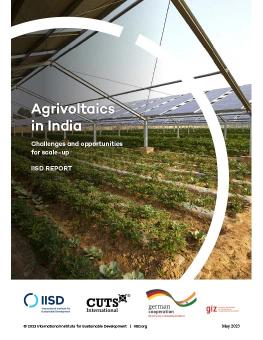
Agrivoltaics in India
Challenges and opportunities for scale-up
Agrivoltaics —the simultaneous use of land for both agriculture and photovoltaic (PV) power generation —offers a potential solution to the competition for land resources between agriculture and renewable energy that may arise in the future in India. This background paper assesses the current state of development and identifies the challenges and opportunities for the commercialization of agrivoltaics in India. The findings in this paper are designed to support state agencies, developers, and other stakeholders in the faster adoption of agrivoltaics by providing policy recommendations, proposing business models, along with a financial and technical transitions mechanism.
In the future, many countries, including India, may witness growing competition for land resources between agriculture and renewable energy. Agrivoltaics—the simultaneous use of land for both agriculture and photovoltaic (PV) power generation—offers a potential solution. Studies show potential for increasing crop yield and panel efficiency, making agrivoltaics an attractive option for farmers and solar developers. Agrivoltaics has grown swiftly across the world in recent years, and India is taking the first steps in its adoption, with more than a dozen pilot projects having been deployed across the country.
This paper reports the experiences of stakeholders (power distribution companies, agricultural universities, private solar PV developers, and farmers) who have implemented agrivoltaics pilots across India. The objective is to bring together evidence from research studies and learnings from pilot projects through interviews with relevant stakeholders to summarize the current status, implementation challenges, and opportunities for commercialization and scale-up of agrivoltaics. The paper aims to inform future policy actions and studies by bringing out key guiding observations and addressing key research questions.
The findings in this paper are designed to support state agencies, developers, and other stakeholders in the faster adoption of agrivoltaics by providing policy recommendations, proposing business models, as well as financial and technical transitions mechanism.
This paper is a supplementary companion to a comprehensive guidebook on how to deploy small-scale decentralized solar power plants under India’s Pradhan Mantri Kisan Urja Suraksha evam Utthan Mahabhiyan (PM-KUSUM) scheme. The guidebook provides practical guidance to states on how they can begin to pilot agrivoltaics in their first phases of deployment under PM-KUSUM, which explicitly states that it can be used to support agrivoltaics.
Supported by the Deutsche Gesellschaft für Internationale Zusammenarbeit (GIZ) GmbH and funded by the German Federal Ministry for Economic Cooperation and Development (BMZ).

You might also be interested in
December 2024 | Carbon Minefields Oil and Gas Exploration Monitor
In November 2024, 23 oil and gas exploration licences were awarded across five countries, with Russia granting the licences that account for the largest portion of embodied emissions.
Increased Support Needed to Achieve India's Clean Energy Goals
India is on track to achieve many of its 2030 clean energy goals but needs to step up government support measures to accelerate the deployment of offshore wind, electric vehicles, and green hydrogen, according to a new report.
Ending Export Credits for Oil and Gas: How OECD countries can end 2024 with a climate win
For a year now, Organisation of Petroleum Exporting Countries (OECD) governments have been negotiating an agreement that could put an end to oil and gas export finance. Following the acrimony in Baku, this would be a very real way for the OECD to show policy coherence, respond to calls from the poorest countries to stop subsidizing fossil fuels, and shift public finance to solutions.
Powering the Clean Energy Transition: Net-Zero electricity in Canada
This brief explains how a shift to clean power generation can offer affordable, reliable electricity, benefiting households and businesses alike.